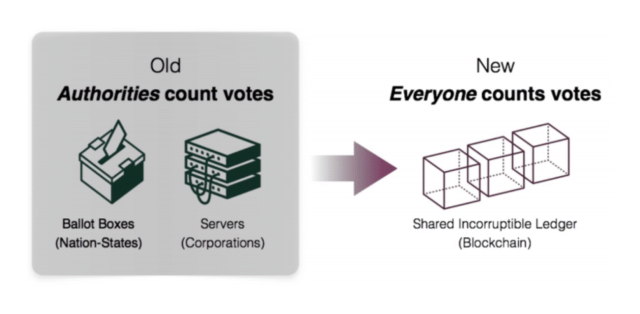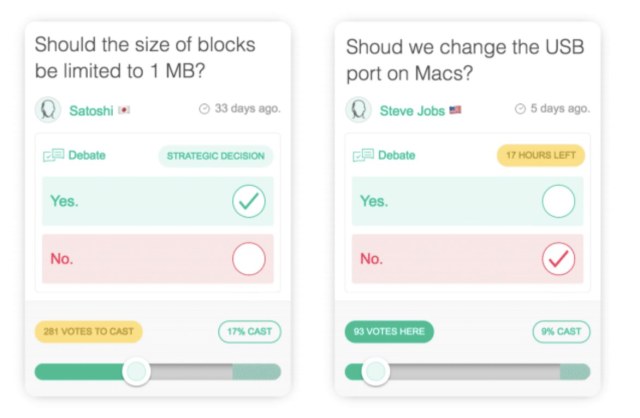This story is part of BREAKER’s Social Good Week, a series looking at ways blockchain technology can engineer progress and help humanity.
Imagine a spectrum of Blockchain Big Ideas. Let’s say it goes from zero to 10. On one end of this continuum, at maybe 0.1, sits a corporate snoozer like “trim two percent of supply chain costs.” [Yawn.]
And then there’s the other end. This is where the dreamers dwell, and this is where things become—depending on your perspective—a jumble of radical, utopian, unfeasible, crazy, weird, dangerous, and brilliant.
This is the space occupied by Santiago Siri, founder of Democracy.Earth. His vision is bold and sweeping and tough to fully understand, but here’s the gist: Blockchain technology—eventually (timeline a whopping TBD)—can let us do away with governments, or what he casually dismisses as “legacy systems.” No more corruption. No more waste. No more Trumps.
The idea is delightfully audacious. And it’s one I’ve spent some time thinking about. Nearly a year ago, in Chiang Mai, while baking in a sauna with a group of crypto-dreamers, I had a vision of what, theoretically, a decentralized utopia could look like. Maybe the blockchain could replace governments? Centuries ago, political philosophers used a concept called the Social Contract to describe how, essentially, we needed governments to help large groups of people make decisions. Back then we had no choice. How else to corral the mobs? This is what I wrote in Thailand: “For the first time in history, there is (theoretically) a tamper-proof way for millions of people to speak up, find a consensus, and make a collective decision. Could a smart contract replace the social contract? Or if that’s too laughably far-fetched, could a smart contract improve the social contract? A smart social contract? It’s an exhilarating thought.”
I’ve had the phrase “smart social contract” in my head since Thailand. It turns out that Siri was way ahead of me. The title of his white paper? The Smart Social Contract. His manifesto makes the case for a “liquid democracy,” which is “based on a dynamic representation model that works with a bottom-up approach: Citizens are able to freely elect within their social graph (friends, colleagues, family) who they want to have as representatives on a specific set of topics.”
Part of their plan involves a Proof of Identity, which they’ll establish with their native Vote Token and Sovereign network. What does that mean, exactly? And what are they doing, exactly, in the short to medium term? This is tougher to pin down. To try and understand what he’s up to, I meet with Siri at the usual den of revolutionaries—his Manhattan WeWork office.
Siri happens to be one of the few people on the planet who actually has experience with radical direct democracy. In 2013, he helped create an Argentine political party called Partido de la Red, or the “Net Party,” which had a platform to let citizens vote, over the internet, on each and every issue. The Net Party notched around one percent of the Buenos Aires vote. (That might sound like peanuts, but it’s close to the three percent they needed to win a local seat. For that matter, one percent is also the share of the vote won by Joe Biden in the 2008 Iowa Democratic primaries.)
Speaking with Siri is like listening to a podcast on 1.5 speed. He thinks fast, talks fast, and pinballs from Borges quotes to technical jargon to time travel to visionary manifestos to sly jokes about Crypto Twitter. I’m confident that I understand at least 40 percent of what he said, and I’m fascinated by all of it. This interview has been condensed and lightly edited for clarity.
What’s your ultimate vision for what you’re doing?
Siri: To me, the best philosopher of this topic is the Argentine writer Jorge Luis Borges.
I love Borges…
Borges was visionary. He predicted everything. He predicted the internet, he predicted the blockchain. He was like Plato. There’s a short story, The Utopia of a Tired Man, published for the first time in The New Yorker. He has an expression that’s something like, “I wish we were worthy of not needing governments anymore.” We need governments because we’re not worthy. So we need to keep each other accountable.
Right, that’s the reason we have governments—
At the end of the day, institutions are a very simple thing. Institutions are a collection of promises. Historically, the way to guarantee those promises was through wars and through authority—
—Might makes right.
[Nods.] And the interesting thing about these new [blockchain] networks, as we’re able to minimize trust, is that we can store promises, and they don’t require the corruptible human element, but the hardness of computation. Mathematical rigor. Entropy. Huge random numbers. When you look at it that way, I think it has some of the properties of the universe itself.

This vision of the future—of no governments, no “legacy systems”—how long until it happens? Are we talking years, decades, centuries?
We will get really confused if we think about this in terms of time. We can start making it happen it now, and the more of us who effectively connect to these new protocols of trusting each other, the closer that future will appear to happen. I think it’s going really fast, if you look at the adoption of bitcoin in the last ten years.
On a more mundane note, what are you guys focused on right now?
Our first customer is Blockstack. They’ve been doing decentralized identity since the early days. Blockstack is rewarding developers that build on their protocol with $100,000 in bitcoin. Through Democracy.Earth, investors—or token holders of Blockstack—decide how to allocate funds to those who are developing the apps. We’re effectively bringing together token holders, investors, capitalists and developers, workers. It’s a consistent shipping of $100,000 every month.
So to vote, you need to hold Blockstack token, and I assume it’s weighted by how many tokens you have.
Right.
So if you have 20 percent of all the Blockstack tokens, you’d have 20 percent of the vote?
Essentially, yes.
Is this live now?
We launched a secret trial in September, and the first public one in December, and we’re about to do the second one. With Blockstack, we had our Product Market Fit moment. We found a business model.
This sounds a little different from my understanding of the Vote Token? Is that a different project, that you’re working on in parallel?
Yeah, it’s different. Last November, we launched the first version of Sovereign—that works with Ethereum or any Web 3 blockchain—on the test-net. We expect to launch on the main-net…now.
Now? Like, now? [I look around at the computers in the office.] Are we in that scene in the Social Network where Zuckerburg gets drunk and launches Facebook?
[Laughs.] I’m saying “now,” but what I should probably say is March 1.
Santi in his natural habitat, demoing the Sovereign platform.

Can you walk me through how it works?
I’ll show you.
[Sitting in an office chair, Siri swivels to his computer and pulls up the Sovereign interface. It looks a lot like, well, Twitter. He creates a new post—it looks like a tweet—and types, “Shall we do a revolution?”
When you create a post, he says, like asking people to vote on something, you tell them what cryptocurrency you want them to stake. You can choose bitcoin, Bitcoin Cash, Ethereum—basically any ERC-20 token. All of the current voting is on-chain, but Siri says they’re working on off-chain functionality. Everything is open sourced, so this platform can be copied and used by others.
You can also filter who will see the post, such as only people in a certain nation, or state, or email address. “You can say ‘only people with an email address of Breakermag.com can vote,’” says Siri, a population that, admittedly, would not be terribly useful at unleashing a revolution.]
The interface looks very Twitter-inspired.
What’s the most successful product in crypto?
Um… bitcoin?
Twitter. [Laughs.] Twitter, twitter.
That’s hilarious.
It’s the most used one.
Is the idea that this Sovereign platform exists somewhere, and people go to it, or is it something that’s integrated into other coins and platform’s ecosystem? Is it a home game or away game, if that makes any sense?
I think the real answer is neither. Because that’s thinking ‘Where are you going to centralize this?’

Ooh, yeah. “Centralize,” is a dirty word.
Right, [is it centralized] with the Enterprise or the Consumer? So I think that we’ll always try to fill in the middle. Because it’s about democracy, we have to build interface-facing technology; it’s not just on the protocol level. On the protocol level, we’re issuing the Vote Token with the functions related to Liquid Democracy.
I’m still not sure I understand. Maybe I’m not seeing the Matrix just yet. How does the Vote Token fit into all of this? [I motion to the Sovereign interface on his screen.]
The Vote Token is very different. Or it’s complementary to this. We’re building our own token, we’re calling it Vote, because it should function as a vote. The thing with Vote is…the biggest lessons we learned with digital democracies is that there are two ways to subvert them. One is gossip, or fake news, as they call it today.
Right, right—
False news about the candidates or whatever. The other is controlling the voting registry. Whoever has control over the voters—whatever authority that is—that person can delay registrations, or accelerate other registrations, and can completely turn the outcome of an election. So when it comes to deploying democracies over the internet, you definitely cannot have identities stored in a database. You can definitely not do democracies with Facebook. You can definitely not do democracies with WeChat.
Right.
You need to have a distributed consensus on the voter registry—on the identity of who gets to participate in an election. From Democracy.Earth, what we see as critical is that we need to build this consensus on voters, and the principle is to validate voters that can prove that they’re humans, because building democracy is about putting checks and balances over non-democracies, artificial intelligences, corporations. We need to ensure each participant is a human. And we need to ensure each participant doesn’t control multiple identities.
How do you do that?
We’re working with an organization—which I cannot disclose just yet—that’s supporting our research and development on understanding Turing-impossible proofs. Which means simple tests that are hard for a machine to do.
Like a much more robust form of CAPTCHA? Or those “pick all the images with street lights.”
Yes. Although Captcha was more designed to train Artificial Intelligences, or to train Google. To train the scanners that recognize written books.
So CAPTCHA was used to train AI?!
Yeah. Google, man! [Chuckles, shakes head.]
[Note: Apparently this sneaky use of CAPTCHA was well-known to everyone but me.]
The world is already ruled by AI. But what we want to do is the opposite of that—a protocol where it’s about humans recognizing other humans. I always use this example: I did a video of my daughter’s birth certificate, and then I hashed that video with a bitcoin transaction, effectively making that video-proof of her existence. That video is certified on the blockchain, and not corrupted in its contents, and shot in that moment of time, and it’s on the immutable ledger.
That sounds hard, though.
It’s very tough. [Laughs.]
So what you’re doing is building a system to identify unique human voters on a decentralized platform?
Yes. The [Vote] token that we’re issuing is designed to generate consensus over this network, that we hope is One Node, One Human. If you want a censorship-resistant democracy, you need to build a consensus around the social nodes of the blockchain economy, not the machine nodes.
Got it.
The Satoshi Paper was One CPU, One Vote. We need to do One Node, One Human.
"When Trump won, it’s like, 'Whoa, America is a fucking Banana Republic! It’s like Argentina! I know this stuff! I know this playbook. Oh, he’s going to go after the media. Oh shit, I’ve seen it! I’ve seen it over and over again. In Argentina, Brazil, Venezuela. This pattern is now repeating itself. It’s the beginning of the end.'"
So where are you with this? Are you already there? Or is that the End Game, which we’re still far away from?
[Pauses. Thinks.] When Donald Trump got elected, I knew we were in business. My wife was pissed off; she’s progressive, and she wanted my daughter to grow up with the first woman president. And OK, I’m fine with that. But when Trump won, it’s like, ‘Whoa, America is a fucking Banana Republic! It’s like Argentina! I know this stuff! I know this playbook. Oh, he’s going to go after the media. Oh shit, I’ve seen it! I’ve seen it over and over again. In Argentina, Brazil, Venezuela. This pattern is now repeating itself. It’s the beginning of the end.’
Thank you. I now think I understand the vision of One Human, One Vote. (Or One Node, One Human.) And I think I understand the Sovereign interface. But what’s the now-ish, short-term utility of what you’re doing?
Voting is the main interaction we do with the internet every day. But we don’t call it voting. We call it “likes,” we call it “hearts,” we call it “retweets.” What made Google successful was actually counting links. It’s the way they tally the votes. Everything we do on the web is voting. But it has been a fake vote. Facebook and Google are advertising companies. It was always a survey trying to get information from the users, but it’s not a two-way conversation. Only the network owners benefit from the surgery. We feel that we’re getting free products, but we are the product and all that, blah, blah, blah. If we want the “like” function to stop being a survey, then the “like” function needs to carry value. And it needs to carry value like a token.
I’m still trying to understand how the Vote Token works. Let’s say I have $1,000 worth of Vote Tokens. What do I do with that? Are we trying to replace Facebook?
The first use-case that we want to pursue with Vote Tokens is to be the consensus of human nodes, of human participants. That’s the use case for our specific token, the Vote Token. We feel that in order to bootstrap a fair democracy over decentralized networks, the only consensus mechanism that should happen on the blockchain is on the registry of voters. You cannot have a database administrator controlling who gets to vote and who does not get to vote. So we are designing the Vote Token to help us build that consensus. And that requires for the token to be fungible, for it to have economic value to fund the efforts that we’re doing in the organization. And in the long-term—[stops himself]—I don’t want to go too crazy. I tend to always go long-term, but you asked about short-term…
You’re good!
What we’re doing short-term [waves at the computers]…we’ve been at test-net since November, and we’re soon going to go to main-net, and you can go to Democracy.Earth, and you will start interacting with the network, right away. You can connect with your typical Web 3 wallet. And you can start posting content.
So for the human recognition phase, is it fair to say that you’re in deep R&D mode?
R&D mode. I’m closing funding this week with a group of philanthropists who are all about understanding consciousness going beyond the Turing test. So we’re working hard on that.
There’s one obvious critique of a voting system where it’s One Token, One Vote [like the model currently used with Blockstack], that if the people with token capital get to control more votes, then power just begets more power. Your overall mission seems very progressive, but this approach feels like the opposite. How do you square that paradox?
Everyone has an opinion. One person says One Person, One Vote. Others say One Token, One Vote. What I think should happen is that everyone’s opinion should be able to be formally expressed in the game. Those who believe One Token, One Vote should be able to formally express that by voting with a token. Those who believe it’s One Human, One Vote should be able to do that.
Fair enough. So you’re building out both sides?
If you want to be the best at protecting something, you have to be the best at attacking it.
Who said that?
I don’t know who said that…me?
Oh, it sounded like a philosopher’s quote!
[Both laugh.]
On that note… Good luck building the future.
Diagrams courtesy the Democracy.Earth white paper. Featured photo by Patrick Züst.
Get the BREAKERMAG newsletter, a weekly roundup of blockchain business and culture.